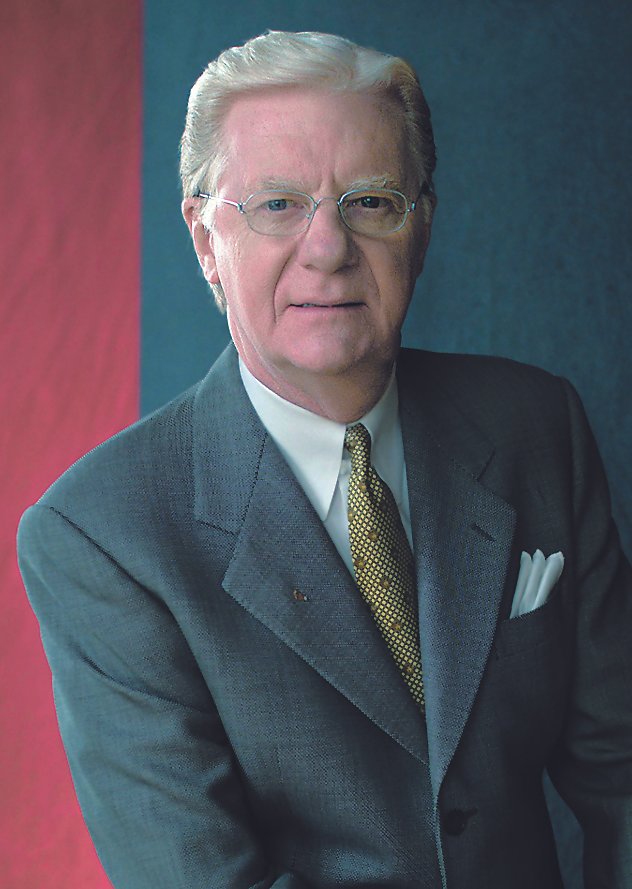In Loving memory of Bob Proctor 1934 – 2022

Is Success Divorced from Compassion, from Love, from Soul?
Bob Proctor interviewed by Christine Miller
Finding the missing pieces to living your ideal life
Christine: What’s the inspiration that has you jumping out of bed in the morning, what keeps you working?
Bob: I love what I do. I’m always working on a big idea, I’m always expanding what I’m doing and I’m just very enthused about it. I love it. So when I wake up, I want to get up and get doing it.People are usually very enthusiastic about doing what they love doing.
The problem with most people is that they are doing what they don’t love doing and they make the erroneous assumption that they have to keep doing it.
Christine: The conventional view of success has been that it is divorced from compassion, from Love, and from soul, based on the idea that you have to be hard and do the other person down to be successful. Do you see that this mindset is changing now?
Bob: I think there’s an enormous shift. I think over the past 25 or 30 years there’s a spiritual transformation taking place in the world, and our view of personal development has changed dramatically. It’s transformed itself from being exclusive to being inclusive. I don’t believe there are any short cuts, but I believe you can take quantum leaps ahead through the transference of information and experience, and that’s where effective coaching can help. I’ve listened to and attended many personal development programmes, and if there was no mention of the soul, no mention of the spirit, even if they were very good, they were incomplete.
Christine: Bob, what is your personal definition of success?
Bob: My definition of success is Earl Nightingale’s definition of success. I adopted it in 1961 and have never changed it:
“Success is the progressive realisation of a worthy ideal”.
Christine: I read that you have undertaken an in-depth study of successful people, and that you’ve spent many years analysing success every day. Would you like to say something about the work you have done over the years, in terms of helping people towards success?
 Bob: Christine, I have found that an enormous number of the very successful cannot articulate why they are successful. This is precisely why large corporations may have a very successful sales person, who may sell 3 or 4 times what their next best sales person sells. Yet they are trying to figure out what that person is doing that is so different, so that they can maybe package it and give it to all their sales people – and they’ll never figure it out.
Bob: Christine, I have found that an enormous number of the very successful cannot articulate why they are successful. This is precisely why large corporations may have a very successful sales person, who may sell 3 or 4 times what their next best sales person sells. Yet they are trying to figure out what that person is doing that is so different, so that they can maybe package it and give it to all their sales people – and they’ll never figure it out.
I’ve worked for companies that have had 20,000 sales people and they have had industrial psychologists shadow the sales stars; they come back and they say they don’t know what they’re doing.I began to study this a long time ago and it struck me as being a very common sense approach; if you want to find out why people are successful, study the successful people, really study them, analyse them. My income went from $4000 a year to over a $1 million a year in a relatively short period of time, 2 to 3 to 4 years.I was so shocked with what happened, I wasn’t satisfied with winning, I wanted to know why and that’s what really got me started.
If you think about it, if you want to learn how to drive a car, you would go to a driving instructor; the driving instructor may be your parent or your sibling, but you would go to someone who can drive a car.If you want to fly an aeroplane, you would not go to the jeweller or the corner butcher shop, you would go to a licensed and effective flight instructor, and then you would do exactly what they tell you.
If you want to be extraordinarily good in your profession or your chosen calling, it only makes sense that you go and find out what the successful ones do; what they read, who they hang around with, who they associate with on a regular basis.Do they go to personal educational programmes and study them like a scientist?Which is what I have done and I have found that the winning is a relatively easy thing to do, if you follow the rules.
If you don’t follow the rules you will struggle all your life and I personally subscribe to the idea that you can do more, with less effort and in a shorter period of time.The idea that you have to work harder and longer is ridiculous, that’s a myth that a bunch of people have established, and it isn’t true.Some people work very long, and achieve some degree of success, but it is not necessary.You can be moving in a very calm, confident manner and really make things happen.
Christine: Absolutely.I think one of the biggest things that I’ve noticed is that people get in their own way. How do you facilitate people so that they can get out of their own way, love themselves more, stop sabotaging themselves?
Bob: First of all, I think an individual has to come to the shocking realisation that they don’t know what to do. There are two definite, distinct sections to the mind that we should focus on, the conscious and the unconscious.
It’s our conscious mind where we seem to gather an enormous amount of information. School is interesting as we become consciously aware of the contents of a book and memorise them so we can repeat them; when we do that, it is expected that we then act on that information, but that is not what people do.
If we listen to them we will find out that they can be pretty bright, but if we watch them they’re not very bright. That’s because the section of our mind that controls our behaviour is not the section of our mind that keeps gathering the information, and we are programmed to live the way we are living, we are programmed to get the results we are getting and if we don’t learn how to alter that programme, it won’t matter how much information we gather, we are still not going to win.
This is what accounts for some very brilliant people being flat broke and not doing very well, and you’ll find other people who are functionally illiterate, they can neither read nor write, and yet they are earning millions of dollars; they are very calm; they are happy; they are healthy and you say ‘how does this happen?’
One person is programmed to win and the other person is programmed to lose; it’s that simple. We have got to understand how the programmes are written, how they are formed, where they come from and how to change them. That’s really what our company ‘Life Success’ is all about, that is what we do.We go in and we show people how to alter the programme and when you alter the programme, you alter the result.
Christine: You say “If success is so simple, why do so few people participate?” concluding that it is basically because they don’t know what to do, there is an ignorance and a not knowing about them. Is there anything you would like to say further on that?
Bob: First of all there are two things that we have to know, these are absolute prerequisites, if we are going to consciously and deliberately improve the quality of our life.
1. We have to clearly understand where we are;
2. We have to clearly understand where we are going.
You do not have to know how to get there but you do have to know those two things. You have to have a very clear, concise picture of the target that you are shooting at, the goal that you want to accomplish, and you have to be honest with yourself about where you are. When I’m talking about where you are, I’m talking about habit patterns, your programme of study, do you react or do you respond, what is your attitude like and we have to get these things straight. You could have a bad attitude and be reacting. As long as we know we have a bad attitude and we are reacting, we can alter it; but if we don’t understand that, we are never going to get to where we want to go.
We have to understand those two points. I think the thing that really made such a huge difference in my life is when Ray Stanford helped me understand that. He was brutally honest with me. He told me, Bob you are one of the most miserable people I have ever met and he was right, I was unhappy. He said you are always broke. He was right. I was earning $4000 a year and I owed $6000. He said you are always sick, and he was right. Now, I didn’t have a terminal illness, but I would get headaches or colds. He said there is nothing wrong with those results, if they are the results you want; but if they are not the results you want, then there is something dramatically wrong with settling for them.
What you want to do is make up your mind you’re going to change them. That is what the owner of a company should do, that is what a sales person should do, that is what a couple should do with a relationship, and we have got to take it on the chin. If we don’t like what is going on, first we should be having a consultation with the results available, looking back at us from the mirror. It’s that simple.
Christine: One of the words that I have heard you use today, and that I have also seen in your writing, is “settling” for things. Is it a question of when people become aware that they have actually “settled” for something, that maybe it wasn’t even a conscious decision that they made? When they realise that they have settled and they don’t have to settle anymore, that’s when they start getting moving and is where a coach is so useful in pointing this out?
Bob: I think that’s exactly right. When we say “settled for”, that’s saying “This is just the way I am, and I really can’t change it” and we settle for what we are programmed to get.
A child in school maybe programmed to get average results and so pretty soon, they become accustomed to settling for average results. Once out of school, they do the same thing. When they get married, they are probably attracted to a person much like themselves, that settles for average results.
What we have got to do is stop and take a look at the results we are getting and think “is this what I want?” and if it is not, say there is absolutely no way I’m going to settle for this, I am going to build this. You see, I believe something Brandeis said many years ago, that “there is a spark of idealism within every human being, which can be fanned into flame and will bring forth extraordinary results.”
I think that is what your magazine (ReSource/Your Ultimate Resource) is doing, it’s fanning the spark of idealism into a flame and I think that’s what you’re doing, that’s what I’m doing, what Steve White our UK Director, is doing. It’s what we are about and I think that is what everybody wants deep down.
They may not be aware of it, but that’s what they want and we should never settle for anything less than we are capable of getting.
Christine: Another of your premises is that “Spirit is always for expansion and expression” – I really appreciated and identified with this statement that spirit is always for growth. Would you like to say a few words in summary about spirituality and the importance of spirit?
Bob: Spirit is all there is, there isn’t anything else. Everything we see is an expression of spirit.
Dr Wernher Von Braun said that the natural laws of the universe are so precise, that we do not have any difficulty building spaceships, and sending people to the moon and we can time the landing with the precision of a fraction of a second. He said these laws must have been set by someone, and after years of studying this spectacular mystery of the Cosmos, he was led into the firm belief in the existence of God.
God is expressed in spirit and spirit infiltrates everything in life. Spirit is 100% evenly present in all places at the same time.
Now if a person has trouble with it they should get over it, because they are spiritual beings, and the spirit operates by law, and so the more we understand it the more we take control of our life. The more we understand the laws by which spirit functions, the more guaranteed we are to have a happy, healthy, fulfilled life. Happiness, health and wealth are natural states for creative beings to live in. Unhappiness, sickness and poverty are not natural states.
We are designed for success. We are designed to live fulfilled lives, and if we don’t understand that we are spiritual beings then we are at a loss. We have to understand first and foremost that we are spiritual beings, we have been gifted with magnificent intellectual factors and we are living in a physical body. A body is a sieve at the best, if you put it under a microscope you would see it jumping, dancing – a radiating, gleaming form.
The potential of power in your body is astronomical. There is approximately 11 million kilowatt hours per pound potential energy locked up in the electrons and atoms of your body. Your body isn’t solid, your body is a molecular structure and it vibrates. The vibration that it is in is dictated by the thoughts that we think and we pull our thoughts from spirit, we are spiritual beings. The more we understand this the more powerful we become to take control over our life.
Our circumstance tells us where we are at mentally, spiritually, physically. We have got to wake up and go inside, if we want to improve what is outside too.
I’ll finish with a quote from James Allen, a great Victorian author from England, who said:
‘Circumstance does not make the man,
it reveals him to himself’.
© Christine Miller First Published Resource Magazine 2006
Read why Christine follows Bob’s definition of success, as an Advocate for Love – her progressive realization of a worthy ideal https://loveintheboardroom.com/advocateforlove/
Bob Proctor 1934 – 2022 In Loving memory
In 1961, Bob Proctor started studying “Think and Grow Rich” and it transformed his life. Bob listened to Earl Nightingale’s condensed recording of the book thousands of time. Then, Bob worked shoulder-to-shoulder with Earl Nightingale at Nightingale-Conant from 1968 to 1973, before leaving to start his own personal development company. Today, Bob has studied thousands of books, continues to read “Think and Grow Rich” every day, and is considered the world’s foremost expert on the human mind.
https://www.proctorgallagherinstitute.com/


 These disturbances seem to hit you like an unexpected UFO from outer space, a swift flashing comet undetected until it breaks through the atmosphere of your life with resounding effect, leaving you wondering what else you can do.
These disturbances seem to hit you like an unexpected UFO from outer space, a swift flashing comet undetected until it breaks through the atmosphere of your life with resounding effect, leaving you wondering what else you can do. 